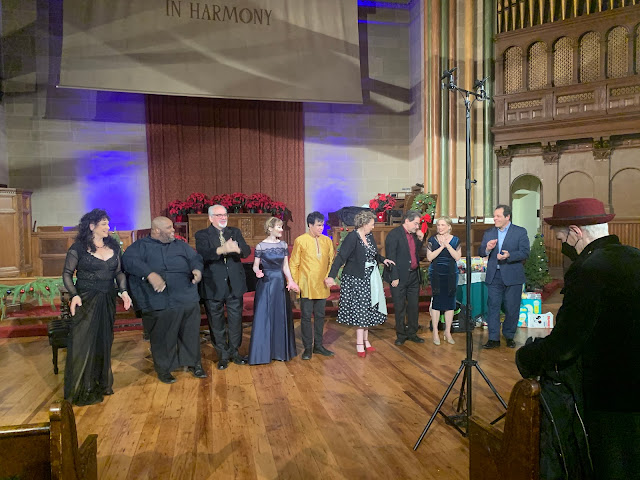(at left) Toni Marie Palmertree
(Photo by meche kroop)
(photo by meche kroop)
Gaetano Donizetti's 1833 opera Lucrezia Borgia was given an impressive concert performance last night at The Center at West Park. With musical values this strong, it should have been staged at The Metropolitan Opera. Why is this bel canto masterpiece so rarely staged? Was Victor Hugo's play (on which Felice Romani based his libretto) too shocking by its incestuous hints? Are the lead roles too difficult to cast?
We do believe we saw it at Caramoor about 10 years ago with Angela Meade in the challenging title role. We don't recall sets so perhaps it was also in concert version. The opera has everything one would wish for in a bel canto opera--a melodramatic plot (very loosely based on history), engaging melodic aspects, interesting orchestration, and opportunities for superstar singers. Last night's performance met all those requirements from the opening percussive rumbles and horn declarations to the final tragic finale.
Maestro Keith Chambers elicited a superlative performance from his orchestra and the roles were sung as grandly as one would wish for. As the titular anti-heroine, Toni Marie Palmertree dazzled with fioritura fireworks and sensitively colored her voice to suit the various circumstances--from tenderness toward her son to firmness toward her husband. The vocal lines flowed like warm honey. The vibrato filled the sanctuary with overtones.One could not have wished for a better performance in this treacherous role.
As Gennaro, her illegitimate son who had been raised apart from his ill-reputed mother, we heard tenor Eric Botto who filled out his role nicely. Unaware of Lucrezia's identity and having been warned of her dangerous nature, his approach to her was wary. But when singing with his friend Maffio Orsini. his voice wa colored with warmth. When there are no sets and costumes to help the story along, and when audience members do not wish to distract themselves from the singing to look at titles on their cell phones, these vocal colorations assume an outsize importance. We particularly enjoyed his duets with Orsini.
Which brings us to the remarkable performance of mezzo-soprano Madison Marie McIntosh as Maffio Orsini. She excelled at creating a character, an important character by virtue of his closeness to Gennaro. The vocal colors that we so appreciated were augmented by meaningful facial expressions and gestures that defied the limiting aspects of the concert style production and the presence of the music stand. We couldn't help wanting to know more about Orsini's friendship with Gennaro. But that could be another opera! This artist has an enormous range and can dazzle with her upper extension and then wow us with husky low notes. We loved the accuracy of the embellishments and skips.
As the jealous husband, Don Alfonso, Duca di Ferrara, bass Eric Lindsey made a fine showing with growling low notes and an effective pianissimo As his confidant Rustighella, tenor James Danner made the most of a small but vital role.
The group of hotheaded young nobles who set the story in motion (by deleting the letter "B" in the Borgia family crest) was played by four fine singers who held their own individually as well as in the ensembles. Tenors Scott Rubén La Marca and Pedro Barrera took the roles of Jeppo Liverotto and Oloferno Vitellozzo, respectively. Baritone Wilbert Kellerman sang the role of Ascanio Petrucci and bass-baritone Nate Mattingly took the role of Don Apostolo Gazella. Although it may not have been appropriate in this concert version, we longed for some differentiation of character. Nonetheless, the harmonies were deftly handled.
We enjoyed the lively chorus as well as they contributed to the musical texture. The score and orchestral parts were supplied by Maestro Eve Queler who must have conducted the work with her Opera Orchestra of New York at Carnegie Hall but that was probably before our time. It is indeed a pity that this opera has been so overlooked. The music is melodic and memorable. And yet, the only piece that we heard before was the Brindisi "Il segreto per esser felice" and it is this piece that is running through our head!
© meche kroop












